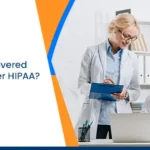What is HIPAA Violation?

May 23, 2024
Table of content:
- What is HIPAA violation?
- What are the HIPAA violation categories?
- What are the examples of most common HIPAA violations?
- How are HIPAA violations uncovered?
- Conclusion
Have you ever thought about how safe patients’ and their families’ information is during a medical emergency? Who ensures its security, and what happens if it’s compromised? This is where the Health Insurance Portability and Accountability Act of 1996 (HIPAA) comes to play. HIPAA is a federal law that was implemented in the year 1996 in the US. The reason behind this law was to protect individuals’ personal health information. Before HIPAA, there were no comprehensive federal standards for protecting the privacy of individuals’ health information. Moreover, this law aimed to improve the continuity of health insurance coverage for individuals, particularly those who changed or lost their jobs. In this blog, we will learn about HIPAA in detail and gain a thorough understanding of HIPAA violations.
What is a HIPAA violation?
If you are exposed to confidential patient information and you disclose it for any impermissible use, you are violating HIPAA. The disclosure of Protected Health Information (PHI) involves the disclosure of medically relevant information related to a patient’s past, present or future. Let’s guide you through possible scenarios that can be considered HIPAA violations:
- Getting access to personal health information without proper authorization, such as an employee accessing medical records without a legitimate reason for doing so.
- Sharing personal health information with individuals or entities without the necessary authorization, which may include disclosing information to unauthorized third parties.
- Failing to implement security and safeguards to protect electronic PHI (ePHI) due to incidents like data breaching or hacking.
- Denying individuals their right to access their health information.
- Not having proper policies and procedures in place to ensure compliance with HIPAA rules, including privacy policies, security policies, and procedures for handling PHI.
- Failing to provide adequate training to employees on HIPAA regulations, leads to unintentional breaches due to lack of awareness or understanding of privacy and security requirements.
- Careless handling of PHI, such as leaving patient records in an unsecured area, improper disposal of records, or transmitting sensitive information without proper encryption.
What are the HIPAA violation categories?
HIPAA violations include monetary penalties and sanction depends on 4 categories. These categories are based on the level of violation and the intent behind causing them. The violation categories also determine the severity of the penalty.
- Category 1: The individual or entity did not know and, by exercising reasonable diligence, would not have known that a violation occurred.
- Category 2: The violation is due to reasonable cause and not willful neglect.
- Category 3: The violation is due to willful neglect but is corrected within a specified time period.
- Category 4: The violation is due to willful neglect, and the individual or entity fails to correct it within a specified time period.
It’s important to note that each violation of a distinct provision within the HIPAA rules constitutes a separate violation, and penalties can accumulate based on the number of violations.
What are the examples of the most common HIPAA violations?
HIPAA violations can occur under several circumstances. Not all breaches happen intentionally. Below are a few common scenarios, that can serve as examples and help you not violate HIPAA in any way:
- Lost or Stolen Devices: A laptop or any electronic device bearing patient records and controversial data might be stolen or left open. HIPAA violation takes place when one negligently handles electronic devices containing PHI (Patient Health Information).
- Incomplete Training of Employees who have newly joined: A newly hired staff member with access to patient records is not adequately trained on HIPAA regulations and hence may unintentionally share sensitive information with unauthorized colleagues. This scenario highlights the importance of providing comprehensive HIPAA training to all employees, especially those handling PHI.
- Sending/Forwarding Patient Information to the wrong recipient: A healthcare provider may accidentally send or forward patient records to the wrong recipient. This scenario demonstrates the risk of improper disclosure and the necessity of verifying recipient information before transmitting PHI.
- Social Media Breach: An employee might post a photo of a patient’s medical records on their personal social media account without the patient’s knowledge. Disclosing PIH on social media is a serious violation of privacy and HIPAA.
How are HIPAA violations uncovered?
HIPAA violations can be uncovered through various means and processes. These processes often include proactive measures, investigations, and incident reporting. Let’s find out step by step how HIPAA violations are uncovered-
- Self-Reporting: Healthcare organizations and their employees are encouraged to self-report potential HIPAA violations.
- Patient Complaints: Individuals who believe their privacy rights have been violated can file complaints with the Office for Civil Rights (OCR), the entity responsible for enforcing HIPAA.
- Audits and Investigations: The OCR conducts periodic audits and investigations to assess covered entities’ and business associates’ compliance with HIPAA regulations.
- Data Breach Notifications: Covered entities are required to report certain types of breaches to the OCR.
- Whistleblower Reports: Employees who witness HIPAA violations within their organization may choose to report them to the OCR.
Conclusion
Healthcare organizations, large or small scale must be extremely particular about patient data management. Only if there’s comprehensive and robust internal monitoring, potential HIPAA violations can be addressed effectively. Quick identification leads to prompt resolutions. To truly build a community where people are health conscious and equally aware, it is important to gain their trust first. HIPAA regulations can help assure individuals that disclosing information for better treatment won’t result in consequences that threaten their privacy.





